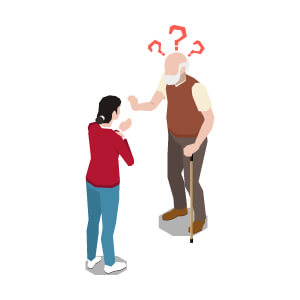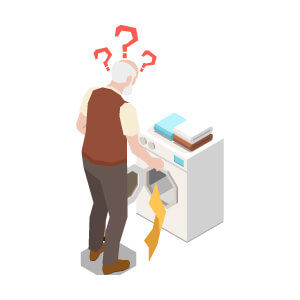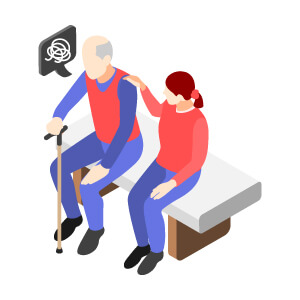By Dr Alan Ch’ng Swee Hock
Positive Healthy Ageing Programme Malaysia

As we age, it is normal to forget things from time to time. However, for some people, memory and thinking issues can become more serious and lead to difficulty completing everyday tasks. Therefore, it is important to understand the differences between age-related normal forgetfulness and conditions like mild cognitive impairment (MCI) and dementia.
What is Mild Cognitive Impairment?
Mild Cognitive Impairment (MCI) is a condition in which individuals experience minor problems with cognition, such as memory or thinking, that are more noticeable than those typically associated with normal ageing. These difficulties are not severe enough to significantly interfere with daily life, and individuals with MCI can usually take care of themselves and perform their normal activities. However, they or their close contacts may notice these changes. While MCI may increase the risk of developing dementia, some individuals with MCI may not experience further decline, and in some cases, the symptoms may even improve. People with MCI have a higher risk of developing dementia, but not everyone with MCI will go on to develop dementia. Globally, more than 6% of people in their 60s have MCI, and the number climbs to more than 37% by age 85.
What is dementia?
Cognitive function deteriorates over time. People with dementia experience more serious cognitive performance symptoms than MCI, affecting memory, thinking, orientation, calculation, language, judgment, emotional control, and social behaviour.
As the severity of dementia deteriorates, it leads to increasing dependency on caregivers. During the mild stage, a person with dementia would require assistance in performing complex tasks like cooking, driving, shopping, managing medications, managing money, paying the bills, and using the phone. In the moderate stage, he would require help in performing personal daily activities i.e. personal hygiene, grooming, dressing, toileting, walking to different places, and eating. During the severe stage, a person with dementia is fully dependent on others in every aspect of daily activities.
Caregivers often face challenges in managing Behavioural and Psychological Symptoms of Dementia (BPSD), which can elevate their stress and lead to a decline in their psychological well-being. Strategies to minimise stress and address the needs of both the person living with dementia and the caregiver are essential for promoting caregiver well-being. It is crucial to identify and manage BPSD to support the mental and emotional health of caregivers Alzheimer’s disease is the most common type of dementia, accounting for 60-70% of cases. Risk factors for dementia include advancing age of ≥ 65 years, female gender, genetic factors, cardiovascular risk factors such as hypertension, diabetes mellitus, hyperlipidaemia, obesity, smoking, excessive alcohol consumption, physical inactivity, hearing loss, and psychiatric illness such as depression.
Strategies to reduce the risk of developing cognitive decline/dementia

- Prevent or manage existing health conditions. Take steps to address any existing health conditions (e.g. hypertension, diabetes, high cholesterol, obesity, depression, etc.) to reduce the risk of developing cognitive declining conditions.

- Get active. Engage in physical activity to support both physical and cognitive health. In general, individuals above 65 years old should have at least 150 minutes of moderate-intensity activity and at least 75 minutes of vigorous-intensity activity each week.

- Eat a healthy and balance diet. Use the Malaysian Food Pyramid and the Malaysian Healthy Plate to ensure a healthy and balanced diet. It is also important to eat a nutrient dense diet.

- Stay cognitively active. Make sure to exercise the brain by taking part in activities like puzzles, reading, or learning new skills.

- Avoid or reduce alcohol consumption and smoking. Reduce or eliminate alcohol consumption and smoking, as these can impair cognitive function.
Conclusion
Distinguishing between normal age-related forgetfulness and more serious cognitive conditions like Mild Cognitive Impairment (MCI) and dementia is important, and it begins with understanding the conditions and their associated risk factors. If you are experiencing any consistent memory issues, talk with your doctor to find out the cause. During an evaluation, doctors may perform tests and assessments to help determine the source of memory problems so that the right treatment plan can be made. Caregivers of people with dementia also face many challenges. To help them, it is important to stay focused on the feeling the person is demonstrating and respond with verbal and physical expressions of comfort, support, and reassurance. Caregivers should also take time for themselves and seek support from others.
| Challenges/Issues: | Helpful tips: |
| Forgetfulness People With Dementia (PWD) do not recall what they talked about and with whom they talked to.  | Courteously answer the questions because PWD have difficulty to recall and may be repeatedly asking question for confirmation as a result of being anxious. |
| Disorientated to time, place and person PWD may repeatedly ask the day, date, where they are and who the people around them are.  | PWD may have problems organising, making plans, and executing tasks correctly. Confirm with them the actions that they are doing and ask what they want to do next step by step. |
| Impaired understanding and judgement: For instance, PWD may become unable to cook, use the remote control for television, or operate the washing machine.  | Engage in the activity together with PWD. For example, instead of allowing person with dementia to cook, let them do simple things like washing vegetables or peeling onions and, at the same time ensure their safety. |
| Delusion: A false belief that is beyond challenge. For instance, PWD may have delusion of theft, that is the false belief that their valuable thing, e.g. money or purse, has been stolen by someone despite being reassured that this did not occur. | Caregiver should show interest in looking for the item together with the PWD. Once search is done, steer the conversation away using a distraction. For example, “we have tried searching for the item, but can’t find it. Lets have a cup of tea and look again later’. |
| Wandering: PWD may also try to leave the house to go somewhere but loses his or her way before reaching the destination. | PWD may have their own reason to go out. The carer can try to engage by asking “where are you going” and “why are you going there?” Carer may then help them to achieve their purpose. It is also useful to put a name tag with their name, address and contact details on their clothes so that others can assist them in finding their way home. |
| Anger: PWD may suddenly get upset and become verbally or physically agitated. They can be sensitive to certain conversations and may become angry and restless as they are unable to express their feelings and difficulties. | Carers will need to be more accommodating and avoid triggers or situations that hurt their feelings. |
| Eating: PWD often forget they have eaten and may also not recognise edible/food items from non-edible items. | Explain regarding timing of meals by mentioning actual time. Avoid having non-edible items within reach for those who cannot tell the difference. |
| Bathing: PWD may not be co-operative to take a bath; they may refuse to undress, wash themselves or dress after their bath. | When a PWD who usually takes bath refuses to do so, it may be due to being unwell. Hence, caregiver need to ask about their physical condition. • During the bathing process – talk to them gently and be careful not to hurt their pride. • During the dressing process – replace their clothes fasteners or buttons with Velcro tape; put signs on their clothes to distinguish the front and back; prepare their clothes in the correct order of putting on. |
| Excretion: PWD may urinate in inappropriate places, repeatedly go to the bathroom or do not understand the need to urinate or defecate. | Caregiver may put a large sign on the bathroom door, keep the doorways bright and switch on the lights in the bathroom at night. Another tip is to bring the PWD to the toilet at frequent intervals. |


